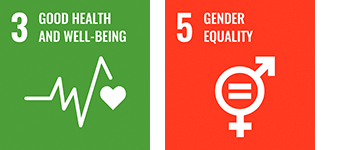Impact case study
Transforming midwifery around the world
Published on 12 May 2022
Changing global standards for the provision, education and regulation of midwifery.

An international research collaboration led by Dundee researchers has influenced international policy on midwifery, leading to changes in the standards of midwifery provision, education and regulation around the world. The collaboration was led by Professor Mary Renfrew with co-author and colleague Professor Alison McFadden and involved 45 researchers from five continents and a range of organisations to address concerns about high rates of maternal and neo-natal deaths linked to poor quality care by investigating the impact of midwifery.
Globally, 50% of maternal deaths and over 60% of neonatal deaths are linked to poor quality care, yet midwifery has often been a contentious area. Decades of underinvestment has resulted in a poor evidence base, with limited information for decision makers and inconsistent implementation. The research focused on three key questions central to the needs of childbearing women:
- What are the components of midwifery that matter to women and babies?
- What is the impact of midwifery on outcomes?
- Who should best provide midwifery care?
The first research output of the research programme provided the evidence base and conceptual foundation for subsequent publications. Collectively, three research papers and a call to action were published in 2014 as The Lancet Series on Midwifery, with a fifth paper on global research priorities published in Lancet Global Health in 2016.
The research provided evidence for the first time, to show that midwifery is an essential intervention in improving the survival, health and well-being of women and newborn infants. The work provided the evidence for a new definition of midwifery and forms the basis of the Quality Maternal and Newborn Care Framework; it has informed World Health Organisation (WHO) and the International Confederation of Midwives (ICM) guidance and standards on quality of care and provided the core evidence for the global ‘Framework for Action for strengthening quality midwifery education for Universal Health Coverage’.
Governments and health services in every continent have acted on the findings to strengthen midwifery, with direct impacts on quality of care for women and newborn infants in multiple countries.
In response to the research, and as a radical shift in policy, the Indian Government instigated their first ever national strategy for midwifery and midwives, launching a programme of work for the education and regulation of professional midwives that will enable all Indian women to access midwives in a country with a population of 1.3 billion. Similar impacts have been seen across multiple African countries and throughout the 11 WHO South-East Asia Region nations.
In Bangladesh, targeted initiatives are extending the quality and reach of midwifery education in a country where the profession is new and still developing. In Sweden the research has influenced the standards and competencies for registered midwives, and the research has provided a basis for education across Latin America and Caribbean countries. In Malawi, education policy for midwifery has changed, and in the UK the research forms the foundation for regulatory standards for midwives and is the basis for education for 10,000 UK midwifery students each year.
The research has provided a basis for advocacy, shaping the thinking of senior policy makers in respect of maternal and newborn care, and influencing funding commitments in the tens of millions of dollars to support midwifery services and education in Mexico, Ethiopia, South Sudan, Tanzania and beyond. The impact of this work, and its benefits for women and children, are expected to grow following its integration in the WHO Midwifery Education Toolkit for maternal, newborn, sexual, reproductive and mental health.
The Mother and Infant Research Unit (MIRU) was established in the University of Dundee in 2013, with a focus on improving the health and wellbeing of women, babies, children and their families and to reduce health inequalities. The unit generates robust, high-quality evidence to support national and international policy and practice, prioritising research that is relevant to current and future needs.
Access the research through Discovery Research Portal

UN Sustainable Development Goals
The Research Excellence Framework (REF) is the system for assessing research in UK Higher Education Institutions (HEIs).